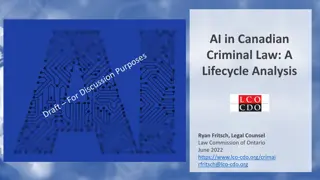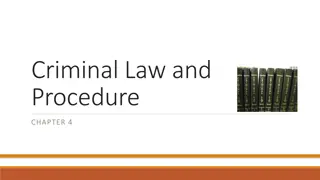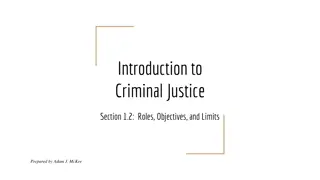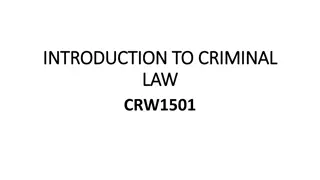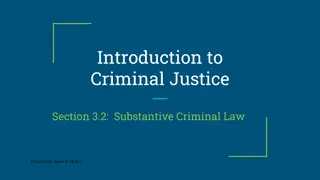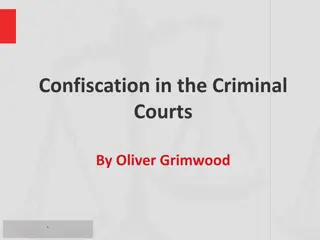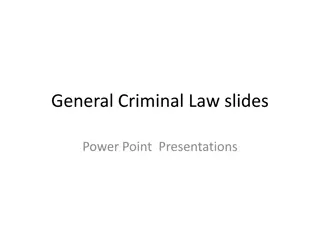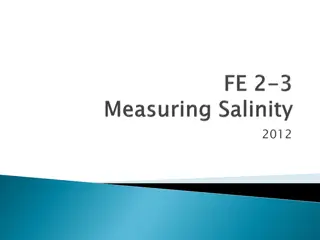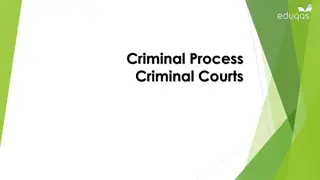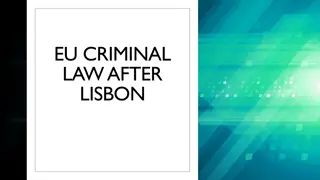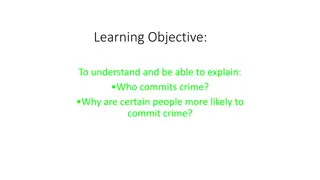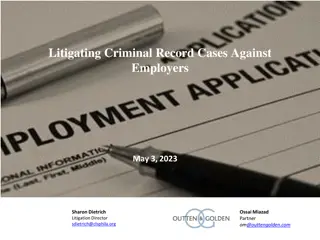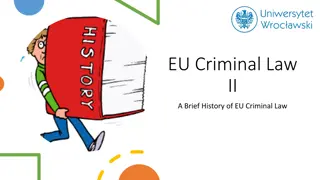Exploring Criminal Law Basics
Delve into the fundamentals of criminal law through topics such as the definition of crime, the elements of a crime, why we have criminal law, and real-life scenarios to understand legal concepts. Discover the significance of criminal law in maintaining safety, encouraging good behavior, and promoting equality in society.
Download Presentation

Please find below an Image/Link to download the presentation.
The content on the website is provided AS IS for your information and personal use only. It may not be sold, licensed, or shared on other websites without obtaining consent from the author. Download presentation by click this link. If you encounter any issues during the download, it is possible that the publisher has removed the file from their server.
E N D
Presentation Transcript
AGENDA Intro to Criminal Law Should it be a Crime Poll Elements of a Crime Mens Rea
CRIME Why do we have crime? Why do we have crime? Certain people/classes of people are viewed to be more likely to become victims of crime or committing a crime. Why do you think that is? What factors contribute to that?
WHY DO WE HAVE CRIMINAL LAW? Safety Encourage good behavior Protection Equality
WHAT IS CRIME? What is your definition of crime? A crime is an act or omission that society deems punishable by fine, probation, or prison time.
SOURCES OF CRIMINAL LAW Common Law: Old English Crimes. Model Penal Code: 37 States have adopted this TPC: Texas Penal Code
HYPO 1 Dwayne sells marijuana out of his home, but only to people over 21 years of age. He uses the earnings to support his family.
HYPO 2 A factory dumps its toxic chemicals into a nearby stream killing all the local catfish. People who consume fish from the contaminated river are at a higher risk for cancer.
HYPO 3 After staying-up all night to care for her sick grandmother, Liz falls asleep at the wheel on her way to work. She crashes into a car killing a 25 year-old man and his daughter.
HYPO 4 Donald is a used car dealer who turns back the odometers on cars he sells.
HYPO 5 Latisha leaves a store with change for a $10 bill after she realizes that she gave the cashier a $5 bill.
HYPO 6 Rick has a baby boy he has never seen. He does not pay child support.
HYPO 7 Ron and Loni see someone break into a car and steal it. They do not report it.
HYPO 8 Ming plans to rob a convenience store with his friend and serve as a look-out person. After dropping his friend off at the store, he decides not to serve as the look-out. During the robbery, the store clerk is shot and killed by Ming s friend.
ELEMENTS OF A CRIME Conduct Mental State Attendant Circumstances Result Motive
CONDUCT Act: Bodily movement, whether voluntary or involuntary, and includes speech. Omission: A legal duty is required for an act of omission ( taxes) Possession
CONDUCT HYPO (a) A person commits an offense if, without the effective consent of the owner: (1) he intentionally or knowingly damages or destroys the tangible property of the owner; Damages or Destroys
ATTENDANT CIRCUMSTANCES Circumstances that must exists surrounding the nature of the conduct or the result
ATTENDANT CIRCUMSTANCES HYPO (a) A person commits an offense if, without the effective consent of the owner: (1) he intentionally or knowingly damages or destroys the tangible property of the owner; Without effective consent from owner; tangible property
RESULT Bodily Injury Death Not every Crime has this element
RESULTS HYPO (a) A person commits an offense if, without the effective consent of the owner: (1) he intentionally or knowingly damages or destroys the tangible property of the owner; Damages or Destroys property
MENS REA Mental State Level of awareness the actor has when performing the act Q: Arson calls for intentionally burning property. Tommy forgot to turn off the stove and burned his neighbor s house down. Would he be guilty of Arson?
MENS REA HYPO (a) A person commits an offense if, without the effective consent of the owner: (1) he intentionally or knowingly damages or destroys the tangible property of the owner; Intentionally or Knowingly
TPC MENS REA LEVELS Intentionally: it is the actor s conscious objective or desire to engage in the conduct or result Knowingly: The actor is aware that his conduct is reasonably certain to cause the result Recklessly: The actor is aware of but consciously disregards an unjustified risk
MENS REA HYPOS R.J. speeds through the parking lot wanting to hit his boss and injure him. Upon striking his boss with the car he kills his boss. R.J. speeds through the parking lot making a beeline for his boss, hitting him, and killing him. R.J. speeds through a a school zone with no intention of killing anyone but strikes a child walking across the cross walk in said school zone killing them.
STRICT LIABILITY CRIMES Crimes without an mens rea requirement Ex: Selling alcohol to a minor, Parking violations, Statutory rape Why would legislatures not require mens rea for these crimes?



